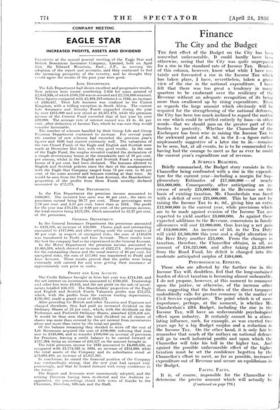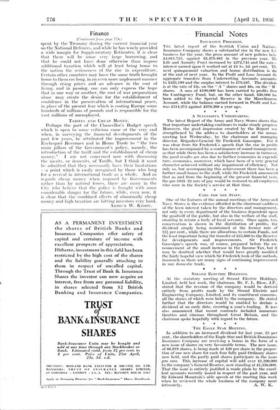The City and the Budget
Finance
THE first effect of the Budget on the City has been somewhat unfavourable. It -could hardly have been otherwise, seeing that the City was quite unprepared for a rise in the standard rate of Income Tax. Readers of this column, however, know what while I have cer- tainly not forecasted a rise in the Income Tax which has taken place, I have, nevertheless, taken a grave view of the rise in the national expenditure, I have felt that there was too great a tendency in many quarters to be exuberant over the resiliency of the Revenue without an adequate recognition of its being more than swallowed up by rising expenditure. Even as regards the large amount which obviously will be required for the strengthening of the national defences, the City has been too much inclined to regard the matter as one which could be settled entirely by loan—in other words—that we should pass on the greater part of the burden to posterity. Whether the Chancellor of the Exchequer has been wise in raising the Income Tax to the awkward point of 4s. 9d. in the 1—a figure rather unpleasantly suggestive of a later rise to 5s.—remains to be seen, but, at all events, he is to be commended for having had the courage to meet as far as ever he could the current year's expenditure out of revenue.
A SURPLUS REACHED.
Briefly summarised, the Budget story consists in the Chancellor being confronted with a rise in the expendi- ture for the current year—including a margin for Sup-. plementary Estimates of 117,600,000 — of nearly 164,000,000. Consequently, after anticipating an in- crease of nearly 124,000,000 in the Revenue on the basis of existing taxation, Mr. Chamberlain was faced with a deficit of over /21,000,000. This he has met by raising the Income Tax to 4s. 9d., giving him an extra £12,000,000 in the current year, while provisions which are to be made against evasion of the Income Tax are expected to yield another 13,000,000. As against these expected additions to the Revenue, concessions in family allowances will cost 12,000,000, thus leaving a net gain of 113,000,000. An increase of 2d. in the Tea Duty will yield 13,500,000 this year and a slight alteration in the Beer Duty another 125,000. From the changes in taxation, therefore, the Chancellor obtains, in all, an amount of 116,525,000, and after taking 15,250,000 from the Road Fund, his deficit is changed into the moderate anticipated surplus of 1484,000.
PSYCHOLOGICAL EFFECTS.
Those who are affected by the further rise in the Income Tax will, doubtless, feel that the long-sustained burden of direct taxation is becoming almost unbearable. I do not propose, however, at this moment to comment upon the justice, or otherwise, of the increase other than suggesting that the burden of the direct -taxpayer undoubtedly calls for greater economy in the matter of Civil Service expenditure. The point which is 'of more importance, perhaps, at the moment, is ,whether Mr. Chamberlain's fifth Budget, including the rise in the Income Tax, will have an unfavourable psychological effect upon industry. It certainly cannot be a stimu- lating influence, Such, for example, as was exerted two years ago by a big Budget surplus and a reduction in the Income Tax. On the other hand, it is only fair to remember that much of the outlays on national defence will go to swell industrial profits and upon which the Chancellor will take his toll in the higher tax. And against the possible unfavourable effect of the higher taxation must be set the confidence begotten by the Chancellor's effort to meet, as far as possible, -increased expenditure out of Revenue and secure an equilibrium in the Budget.
. FACING FACTS.
It is, of course, impossible for the Chancellor to determine the precise amount which will actually be (Continued on page 776.)
Finance
(Continued from page 774.) spent by the Treasury during the current financial year on the National Defences, and while he has wisely provided a wide margin for Supplementary Estimates, it is clear that there will be some very large borrowing, and that he could not have done otherwise than impose additional taxation which will at least bring home to the nation the seriousness of the rise in expenditure. Certain other countries may have the same truth brought home to them ere long, in an even more unpleasant manner through rising prices and an advance in the cost of living, and in passing, one can only express the hope that in one way or another, the cost of war preparations alone may create the desire for the establishment of confidence in the preservation of international, peace, in place of the present fear which is costing Europe some hundreds of millions of pounds and is responsible for the vast millions of unemployed.
TARIFFS AND CHEAP MONEY.
Perhaps the part of the Chancellor's Budget speech which is open to some criticism came at the very end when, in surveying the financial developments of the past feiv years, he attributed the iniprovement- in the Exchequer Revenues and in Home Trade to "the two main pillars of the Government's policy, namely, the introduction of the tariff and the establishment of cheap money." I am not concerned now with discussing the merits, or demerits, of Tariffs, but I think it must be admitted that they necessarily have their limitations --a point which- is easily recognised by those who long for a revival in international trade is a whole. And as regards cheap money when imposed by Governments rather than by natural forces, there are many in the City who believe that the policy is fraught with some considerable danger for the future, while, even now, it is clear that the combined effects of abnormally cheap money and high taxation are hitting investors very hard.
ARTHUR W. KIDDY.



















































 Previous page
Previous page